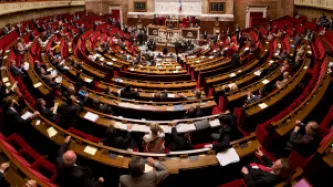Search
Content type: News & Analysis
The government of Pakistan is proposing a new law that significantly threatens privacy rights, in a blatant attempt to establish a legal regime containing broad powers when it comes to obtaining, retaining, and sharing data obtained through criminal investigations, including communications data.
The Prevention of Electronic Crimes Act, 2014, contains worrying aspects that threaten the right to privacy, including a provision that would permit unregulated information sharing with foreign…
Content type: Press release
The ruling today from the European Court of Justice, invalidating the European Union’s 2006 Data Retention Directive policy, was strong and unequivocal: the right to privacy provides a fundamental barrier between the individual and powerful institutions, and laws allowing for indiscriminate, blanket retention on this scale are completely unacceptable.
As the Court states, it is not, and never was, proportionate to spy on the entire population of Europe. The types of data retained under this…
Content type: News & Analysis
In response to a consultation being undertaken by the UN in accordance with December’s General Assembly resolution on the right to privacy in the digital age, Privacy International today called on the United Nations to recognise that mass surveillance is incompatible with human rights.
The submission to the Office of the High Commissioner to Human Rights confronts some of the biggest challenges to the right to privacy in the digital age, debunks some of the justifications put forth…
Content type: Press release
In response to the ruling against David Miranda over his detention at Heathrow, Privacy International Executive Director Dr. Gus Hosein said:
Schedule 7 of the Terrorism Act of 2000 is a law intended to fight terrorism, and was not drafted to target people like David Miranda. In this instance however the government used it to seize the devices of journalists to intimidate and obstruct the reporting of mass and unlawful surveillance practices of the British government. To equate journalism…
Content type: News & Analysis
In the ongoing story about the possible surveillance of the Garda Siochana Ombudsman Commission in Ireland, a number of new details have emerged from Verrimus, the security consultancy agency tasked with investigating the spying. A recent Irish Independent report levelled a number of criticisms at Verrimus, saying that Verrimus in fact detected their own UK phones during their sweep and that they erroneously claimed this to be evidence of a UK IMSI Catcher.
In response to the Independent’s…
Content type: News & Analysis
Bulk metadata collection. The tapping of undersea fibre optic cables. Sabotaging internet security standards. Cyber Attacks. Hacking.
In almost every week since last summer, a new Snowden document has been released which details the growing surveillance powers and practices of intelligence agencies, each one astonishing in its own right. The documents have exposed the illegal activities and intrusive capabilities of the UK’s intelligence agency, GCHQ, which has secretly sought to exploit and…
Content type: News & Analysis
The current legal framework governing intelligence activities in the UK is unfit for purpose in the modern digital era, and reform is urgently needed.
With this in mind, today Privacy International responded to the Intelligence and Security Committee’s call for evidence, addressing the question, “Whether the legal framework which governs the security and intelligence agencies’ access to the content of private communications is ‘fit for purpose’, given the developments in information technology…
Content type: News & Analysis
While revelations about NSA mass surveillance dominated the news in late 2013, a less well-publicised scandal was engulfing the Australian intelligence services, which had just raided the offices of a lawyer representing the small nation of East Timor in an international case against Australia.
The case concerns allegations that Australia spied on East Timor’s cabinet during sensitive commercial negotiations over oil and gas revenues. If true, this was spying on the basis of greed, to exploit…
Content type: News & Analysis
The latest Snowden document revelation, which shows how GCHQ and the NSA are conducting broad, real-time monitoring of YouTube, Facebook, and Blogger using a program called "Squeaky Dolphin," is the most recent demonstration of the immense interception capabilities of intelligence services.
Despite the program's cute name, "Squeaky Dolphin" is shocking in its ability to intercept raw data, which includes sensitive personal and location information, and keep tabs on people across the world who…
Content type: News & Analysis
The reforms announced today, while positive in some respects, are completely inadequate to address the heart of the problem. Privacy International welcomes steps to minimise the data collected and retained on non-Americans, and the call to increase transparency around requests made to communications service providers. However, in the face of mass surveillance, unaccountable intelligence sharing, arbitrary expansions of the definition of ’national security’, and debased encryption standards…
Content type: News & Analysis
Privacy International's partner organisation, Bytes for All, has filed a complaint against the Government, decrying the human rights violations inherent in such extensive surveillance and demonstrating how the UK's mass surveillance operations and its policies have a disproportionate impact on those who live outside the country.
Bytes for All, a Pakistan-based human rights organization, filed its complaint in the UK Investigatory Powers Tribunal (IPT), the same venue in which Privacy…
Content type: News & Analysis
In the same week that the Advocate General of the European Court of Justice labelled the retention of electronic communications data throughout Europe as a “serious interference with the right to privacy”, the French National Assembly has codified into law a suite of invasive and unrestrained surveillance powers, allowing an expanded range of government bodies invasive access to citizens electronic communications data and content and threatening the privacy rights of the French people.…
Content type: News & Analysis
Australia’s intelligence agencies have beenconducting mass surveillance for more than half a century, routinely sharing the fruits of such labours with their Five Eyes allies in the US, UK, Canada and New Zealand. Australian spying facilities are staffed by the NSA and the UK’s GCHQ, and Australian intelligence officers are routinely tasked with work by their Five Eyes counterparts. Australia and its allies have infiltrated every aspect of the modern global communications…
Content type: News & Analysis
Last week, we learned that the National Security Agency is gathering nearly 5 billion records a day on the whereabouts of mobile phones where ever they are in the world. The report from of the Washington Post, shows the extraordinary scale and reach of the NSA programs that attempt to know everything about us including our location, at any time.
Unfortunately, a scaled down version of this system is also being sold by private surveillance contractors to the highest bidder. The…
Content type: News & Analysis
Two new categories of surveillance systems were added into the dual-use goods and technologies control list of the Wassenaar Arrangement last week in Vienna, recognising for the first time the need to subject spying tools used by intelligence agencies and law enforcement to export controls.
While there are many questions that still need to be answered, Privacy International cautiously welcomes these additions to the Wassenaar Arrangement. Undoubtedly, these new…
Content type: Long Read
The recent revelations, made possible by NSA-whistleblower Edward Snowden, of the reach and scope of global surveillance practices have prompted a fundamental re- examination of the role of intelligence services in conducting coordinated cross-border surveillance.
The Five Eyes alliance of States – comprised of the United States National Security Agency (NSA), the United Kingdom’s Government Communications Headquarters (GCHQ), Canada’s Communications Security Establishment Canada (CSEC), the…
Content type: Press release
Privacy International today has filed a complaint with the Australian Inspector-General of Intelligence Security, calling for an immediate investigation into deeply troubling reports that the Australian intelligence services offered to violate the privacy rights of millions of citizens by handing over bulk metadata to its Five Eye partners.
According to the leaked Five Eyes memo published in the Guardian on 2 December, the Australian Signals Directorate, during a meeting…
Content type: Report
The recent revelations, made possible by NSA-whistleblower Edward Snowden, of the reach and scope of global surveillance practices have prompted a fundamental re-examination of the role of intelligence services in conducting coordinated cross-border surveillance.
The Five Eyes alliance of States – comprised of the United States National Security Agency (NSA), the United Kingdom’s Government Communications Headquarters (GCHQ), Canada’s Communications Security Establishment Canada (CSEC), the…
Content type: News & Analysis
With the launch of the "Eyes Wide Open" project, Privacy International has put together a fact sheet about the secretive Five Eyes alliance. Consider this a guide to the secret surveillance alliance that has infiltrated every aspect of the modern global communications system.
Beginning in 1946, an alliance of five English-speaking countries (the US, the UK, Australia, Canada and New Zealand) developed a series of bilateral agreements over more than a decade that became known as the UKUSA…
Content type: Press release
The United Nations General Assembly should approve a new resolution and make clear that indiscriminate surveillance is never consistent with the right to privacy, five human rights organizations said in a November 21, 2013 letter to members of the United Nations General Assembly.
After heated negotiations, the draft resolution on digital privacy initiated by Brazil and Germany emerged on November 21 relatively undamaged, despite efforts by the …
Content type: News & Analysis
The following is an excerpt from a blog post that originally was published by EJIL: Talk!, and is written by Carly Nyst, Head of International Advocacy at Privacy International:
The recent revelations of global surveillance practices have prompted a fundamental re-examination of the role and responsibility of States with respect to cross-border surveillance. The patchwork of secret spying programmes and intelligence-sharing agreements implemented by parties to the Five Eyes arrangement (the US…
Content type: News & Analysis
Privacy International is pleased to announce the Surveillance Industry Index, the most comprehensive publicly available database on the private surveillance sector.
Over the last four years, Privacy International has been gathering information from various sources that details how the sector sells its technologies, what the technologies are capable of and in some cases, which governments a technology has been sold to. Through our collection of materials and brochures at surveillance trade…
Content type: News & Analysis
It was a throwaway line in a Washington Post article, one of the many stories about government surveillance in the past few months.
By September 2004, a new NSA technique enabled the agency to find cellphones even when they were turned off. [Joint Special Operations Command] troops called this “The Find,” and it gave them thousands of new targets, including members of a burgeoning al-Qaeda-sponsored insurgency in Iraq, according to members of the unit."
Being able to track a mobile phone,…
Content type: Long Read
Privacy International filed formal complaints with the Organisation for Economic Cooperation and Development (OECD) in the UK against some of the world’s leading telecommunication companies, for providing assistance to British spy agency GCHQ in the mass interception of internet and telephone traffic passing through undersea fibre optic cables.
According to recent reports, BT, Verizon Enterprise, Vodafone Cable, Viatel, Level 3, and Interoute granted access to their fibre optic…
Content type: Press release
Privacy International welcomes the resolution introduced on Friday by Germany and Brazil to the UN General Assembly, affirming the international human right to privacy and its essential nature to the realization of other rights, and condemning mass State surveillance of individuals around the world.
Should the resolution be adopted, it will be the first major statement by a UN body on privacy in 25 years, since General Comment 16 in 1988 by the Human Rights Committee. It is also the first…
Content type: Press release
General Assembly Should Pass Strong Resolution on the Right to Privacy in the Digital Age
(New York, November 21, 2013) – The United Nations General Assembly should approve a new resolution and make clear that indiscriminate surveillance is never consistent with the right to privacy, five human rights organizations said in a November 21, 2013 letter to members of the United Nations General Assembly.
After heated negotiations, the draft resolution on digital…
Content type: News & Analysis
Just search for the term "surveillance state" and you’ll pull up various uses of the term or news articles citing the phrase.
In some respects, this newfound concern can’t be a surprise; given vast new amounts of information in the public sphere since the Edward Snowden leaks began in June. However, it is critical to nail down the exact meaning of the term, so as the public and governments have the debate over State spying, we can actually know what we're talking about. Most importantly, this…
Content type: News & Analysis
What a difference a few months, and some intelligence agency leaks, make.
In early June an important report warning of increasing State surveillance was submitted to the United Nations Human Rights Council. It was met with barely more than scant attention. Days later, Edward Snowden’s leaks hit the front page of the Guardian, and woke the world up to how intelligence agencies in the US and UK are using questionable legal justifications to spy on their own…
Content type: News & Analysis
For the first time since the Snowden revelations exposed the vast reach and scope of Britain's surveillance and intelligence activities, Parliament will openly debate the need for greater oversight of the intelligence and security services.
In the five months since the first of the Snowden leaks offered an insight into the government's mass surveillance capabilities, the political discourse has been disappointingly devoid of any serious discussion of the fundamental issues raised about the…
Content type: News & Analysis
At the first major discussions on internet governance since the Snowden leaks began in June 2013, Sweden’s Foreign Minister has called for the establishment of principles to define the application of existing human rights obligations to the digital realm.
Noting that the Snowden revelations have given birth to “a new debate about surveillance and privacy”, Foreign Minister Carl Bildt acknowledged that internet governance is being challenged, as some States operate vast surveillance…






















